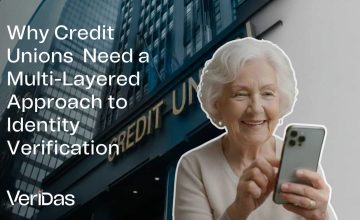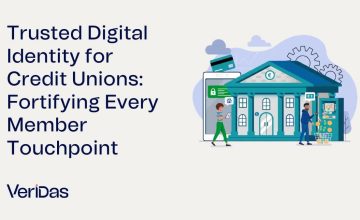In today’s digital-first world, securing online transactions and verifying user identities with absolute confidence is more critical than ever. Biometric verification is a technology that confirms a person’s identity using unique physical or behavioral traits—most commonly, their face or voice. This method is rapidly replacing traditional passwords and PINs across sectors like banking, telecommunications, and public services thanks to its unmatched combination of security, speed, and user convenience.
In this article, we’ll explore exactly what biometric verification is, how it works, and why global organizations are adopting it as the new standard in identity authentication. We’ll also highlight how Veridas, a leader in biometric solutions, is helping companies verify identities in a fast, secure, and regulation-compliant way.
What Is Biometric Verification?
Biometric verification is the process of using unique biological traits to confirm a person’s identity. It is a method that uses features like the face or voice to match a live sample with a stored Renewable Biometric References (RBRs).
Biometric Verification Meaning
The biometric verification meaning refers to authenticating a person based on characteristics that are inherently tied to them. Unlike passwords, biometrics can’t be forgotten or easily stolen. That’s why biometric verification means a leap forward in both security and user convenience.
How Biometric Identity Verification Systems Work
A biometric identity verification system works in five steps:
- Capture biometric data (e.g., facial image or voice recording).
- Preprocess and clean the data.
- Extract unique features and generate a biometric vector.
- Compare it against stored RBR’s (1:1) or search in a database (1:N).
- Make a decision based on similarity scores.
Veridas enhances this with ISO 30107-3 Level 2 certified active and passive liveness detection.
Types of Biometrics: Facial and Voice Biometrics
Facial Biometrics
This method captures a user’s face and transforms it into a unique biometric vector. Facial recognition is quick, widely adopted in mobile access, and non-invasive. Veridas’ facial biometric engine ranks among the top two worldwide in NIST evaluations for 1:N face recognition with 12 million records.
Voice Biometrics
Voice-based biometric verification authenticates users by analyzing the unique characteristics of their voice. It’s ideal for phone channels and contact centers. Veridas’ voice biometric engine achieved #2 globally in the NIST SRE 2021 challenge among commercial vendors.
Applications of Biometric Verification
Biometric verification is already a transformative force in numerous industries. Veridas supports a wide range of use cases with proprietary, high-accuracy, and regulation-compliant solutions:
Financial Services and Banking
Banks like BBVA, CaixaBank, and Scotiabank rely on Veridas for secure, scalable onboarding, bank biometric verification, identity recovery, and transaction validation. Veridas’ facial and voice biometrics are fully aligned with SEPBLAC (Spain), CNBV (Mexico), and GDPR standards.
Telecommunications
Telco leaders such as Telcel and Euskaltel implement Veridas’ biometric solutions to streamline user registration, perform SIM swaps, and securely verify identity when changing numbers.
Government and Public Administration
Governments use Veridas for citizen authentication and access to services:
- Facial verification with national databases like INE (Mexico), AAMVA (USA), and PID-SVD (Spain).
- Certified video identification for digital certificate issuance with FNMT.
- Facial access control for national security events with the Spanish Civil Guard.
Mobility and Transportation
Mobility providers like Cabify and Renfe deploy Veridas to verify identities during onboarding and reservations, reducing fraud while enhancing convenience.
Online Gambling and Gaming
Veridas enables biometric age verification and real-time user identification for operators like Codere and Holland Casino. The system checks against exclusion lists and enforces compliance with local gambling laws.
Utilities
Endesa and other utility firms use Veridas voice biometrics in contact centers to replace security questions, significantly reducing call times and fraud risks.
Education and Universities
UPNA uses Veridas’ biometric ID verification for contactless library access, replacing plastic cards with seamless facial recognition.
Sports and Entertainment
From CA Osasuna in Spain to the Chilean Football Federation, Veridas enables stadium access via facial recognition. Fans enter venues without tickets or phones, enhancing both security and user experience.
Real Estate and Smart Buildings
Organizations like Repsol and BBVA provide facial access to their headquarters using Veridas’ ZeroData biometric terminals, ensuring secure, cardless entry.
Retail and E-commerce
Retailers use Veridas for digital onboarding, biometric verification example scenarios such as e-signatures and wallet-based authentication. The NEXUS wallet empowers users to share credentials with full control and privacy.
Advantages and Challenges
Enhanced Security and Convenience
- Security: Biometrics are extremely difficult to forge.
- Convenience: Users don’t need to remember passwords.
- Speed: With Veridas, biometric verification takes just seconds.
Challenges
- Data privacy risks.
- Need for compliance with local and international regulations.
- Technical limitations in low-light or noisy environments (depending on modality).
Compliance and Legal Standards
Biometric systems must align with laws and standards such as:
- GDPR (Europe): Biometric data is considered sensitive.
- BIPA (Illinois, US): Strict opt-in requirements for biometric data use.
- ISO/IEC 30107: International standard for presentation attack detection.
- EU AI Act: Classifies biometric verification as low risk under user control.
Trends in Biometric Verification
AI-Powered Biometrics
Deep learning improves recognition speed and accuracy. Veridas engines are fully AI-powered and top-ranked by NIST.
Multimodal Authentication
Combining face and voice provides enhanced security. Veridas supports both, even simultaneously.
Continuous Authentication
Going beyond one-time checks, some systems use behavior patterns to keep verifying the user during a session.
Veridas: Redefining Biometric Identity Verification
Veridas provides a modular identity verification platform with:
- Facial, voice and document verification
- Integration via SDK/API or Plug & Play
- Full GDPR and ISO-compliant infrastructure
- Over 100 million identity verifications per year
Solutions include:
FAQs about biometric verification
What is biometric verification?
It’s the process of confirming identity using biological traits like your face or voice.
What is biometric verification in bank settings?
It verifies customers when they open accounts or authorize transactions using biometrics.
How to do biometric verification?
Submit a selfie or voice sample. The system compares it with a stored RBR.
What are some biometric verification examples?
Facial access to offices, biometric age checks for gambling, voice login to contact centers.
What’s the difference between verification and authentication?
Verification (1:1) confirms your identity. Authentication can be continuous or involve identifying you among many (1:N).






